CLAS 101: Introduction to Classes
INFORMATION ON THIS PAGE IS BEING REWRITTEN AND REVISED FREQUENTLY
Classes in The Seven Seals are split into three broad categories: Melee, Mischief, and Magic. Each group contains 4 basic classes, 1 advanced class, and 1 master class. This adds up to 18 different class options in total. In addition, each of the 4 heroes have their own unique class that combines elements of other classes with special abilities not available to them.
Class attributes are ranked on a scale of S-F, with S being the absolute best and F being nonexistent. A class with an S in something is the best at that particular attribute, while a class with an F has no skill in that area. For example, Warriors, which have Fs in MP, will never, ever get a single point of MP without changing classes. There are slight variations in what the scale represents; both Rangers and Black Mages have Ds in Defense, for example, yet Rangers actually have slightly better Defense than Bards. The letter grade shouldn't be taken as an absolute scale, but more of a guideline regarding class strengths and weaknesses.
Read on for an overview of the classes available in The Seven Seals.
CLAS 201: Melee Classes
Melee classes hit things. They hit things better than other classes hit things and can be hit more times than other classes in return. Melee classes generally have excellent Attack, Defense, and HP, but lack Magical Defense or Magical Attack and may have sub-par Agility as well. Melee classes lack a wide variety of skills, but make up for that with sheer fighting spirit.
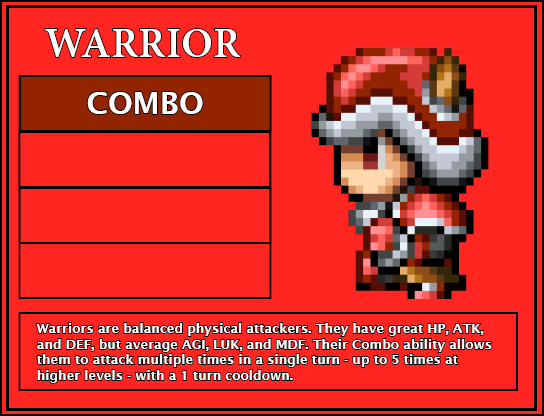
Warriors are straightforward, simple killing machines. As the image denotes, Warriors can equip almost all weapons and armor. Their Multi-Attack ability allows them to unleash a flurry of blows, at the cost of leaving them unable to act for a short while. However, they lack any other skills, making them a one trick pony of sorts - albeit a very useful trick. Take a Warrior if your party needs some serious physical firepower or if you're the old-school type who believe fancy skills are no substitute for old fashioned murder.
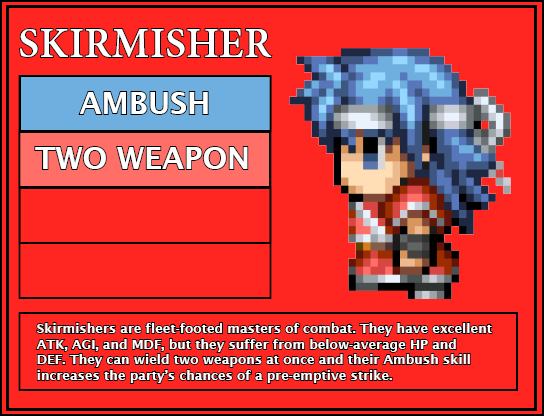
Skirmishers sacrifice some defensive power in exchange for excellent offense and speed. With the ability to wield two weapons, they can really crank out the damage. In addition, their Ambush skill increases the chance that the party will strike first and gain the upper hand in battle; this valuable advantage means the Skirmisher plays well in parties that are all about crushing their opponents before getting crushed in return. Bring a Skirmisher along to add some much needed speed to a lethargic party or make a lightning-fast group even faster.
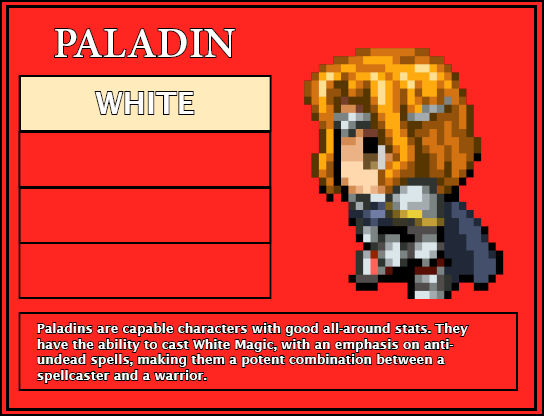
Paladins straddle the boundary between Melee and Magic. They have a well-rounded set of statistics, good equipment selection, and a variety of healing and anti-undead skills to round them out. While Paladins will never match a Warrior's damage output and their Magic Attack isn't quite as good as the Cleric's, meaning their healing won't be as effective, they act well as a middle ground between the two. Bring a Paladin along if you've got three characters and aren't sure what to do about a fourth. They're helpful in a variety of situations.
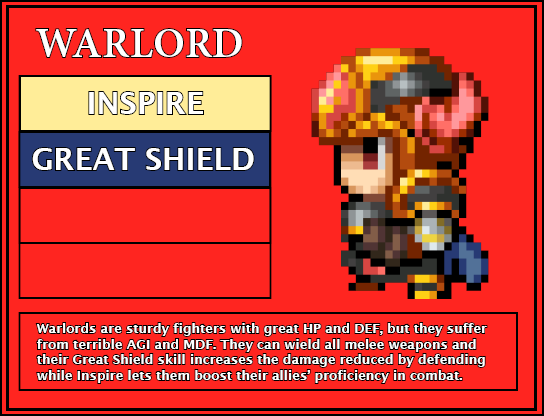
Warlords never say die. With stellar Defense and a mountain of HP, these guys will be up and kicking long after everyone else has gone down. Their Inspire skillset allows them to buff allies and debuff enemies, making them a great class to build an offense around. Great Shield increases the damage reduction from defending and also allows a Warlord to step in and protect an ally when their life is on the line. Players who understand the importance of defense should bring along a Warlord and watch those Game Overs disappear.
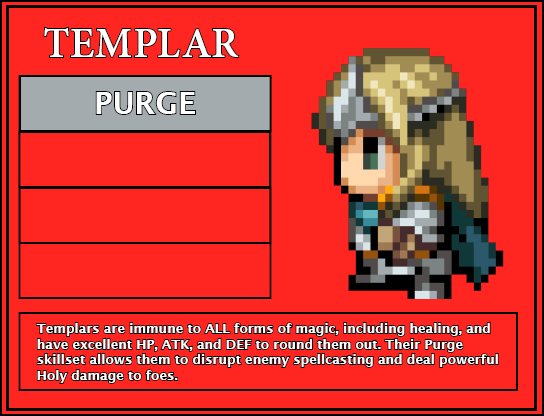
Templars are the advanced melee class, accessible in the recruiting screen through secret methods. As the image notes, Templars are to magical attacks what Warlords are to physical attacks, but even better. Templars have complete immunity to ALL forms of magic, including healing spells and buffs, meaning that novice players should think carefully when bringing one along. Their Purge abilities allow them to disrupt enemy spellcasting and can change the tide of battle in an instant when used properly. Templars are a great option for players looking for a more challenging experience or those who want more advanced strategic options in battle.
CLAS 215: Magic Classes
Magic classes cast spells with a variety of effects. While there are non-magic classes that cast spells, they lack the specialization that magic classes have. Mages generally have excellent MP, Magic Attack, and Magic Defense with solid Agility as well. However, they have poor Attack and Defense for the most part as well as bad HP. Most magic classes learn spells that are useful in and out of battle.
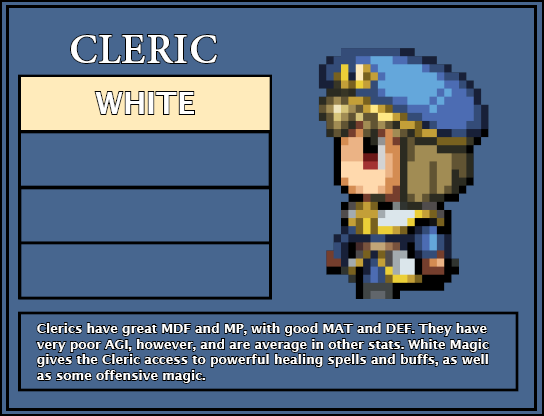
A class that doesn't require much of an introduction, Clerics act in The Seven Seals the same way they do in most games. They specialize in healing magic and offer some offensive spells that are mostly focused on doing damage to undead. In addition, they have access to a solid selection of buffs to keep the party fighting in tip-top shape. Think of the Cleric as a counterpart to the Paladin. One is more melee focused and one is more magic focused. Bring along a Cleric if you want to stay alive and have a decent secondary or tertiary damage dealer.
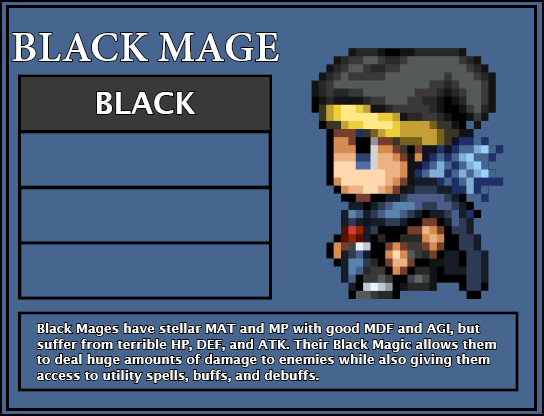
You've seen this before. Black Mages do what they always do: devastate enemies and crumple when faced with a light breeze. In addition to their robust magical offenses, Black Mages also have access to some useful utility spells and debuffs. Bring along a Black Mage for sheer magical firepower; they are especially useful in the first two chapters, where your heroes lack great magical ability.
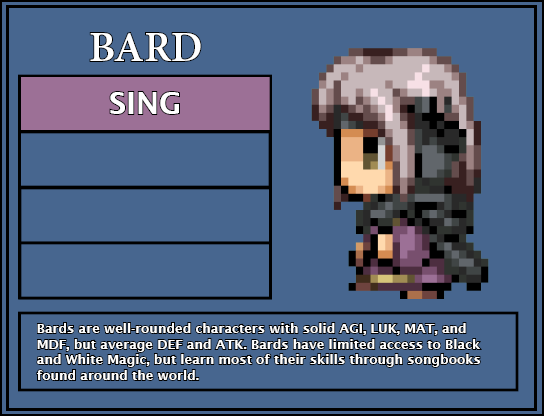
Bards blend the barrier between Mischief and Magic. They run off their own, semi-unique list of spells, but also have access to some standard magic. They require some extra investment due to songbooks, but they gain access to useful and powerful skills, so it's worth it in the end. They have more utility spells than other magic classes and also have access to unique buffs and debuffs. Bringing a Bard instead of a Black Mage or Cleric is a risky move, but one that provides a party with a lot of different strategies.
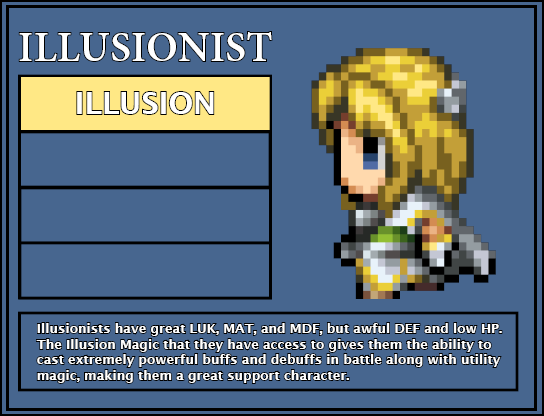
The Illusionist learns very few offensive or healing spells, but they can make their fellow party members even better than they already are. Think of the Illusionist as a magical version of the Warlord; they can buff and debuff like crazy and act as a solid center for a balanced party. They also have access to some utility spells, making them a good support character if nothing else.
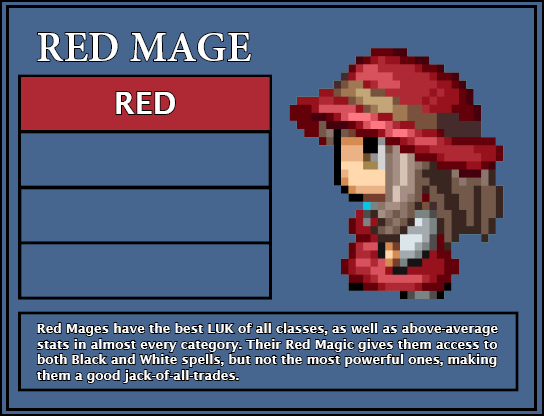
Red Mages are the advanced magic class, combining the powers of black and white magic to give them unparalleled utility. Ironically, they do not learn any utility skills, so bringing one along might cause some headaches out of battle. In addition, Red Mages cannot learn the most powerful spells that classes like the Black Mage and Cleric can. They make up for this with decent physical stats, allowing them to serve as a handy secondary attacker in a pinch. Bring a Red Mage along if you're sitting at three members and unsure how to complete your party. You really can't go wrong with one, if you can figure out how to add them.
CLAS 221: Mischief Classes
In general, mischief classes are a mixed bag. They all offer different skills and out of battle utility, but do so in radically different ways. Some require special items to learn skills, others do better without items, and some could be placed in any of the three categories and feel right at home. Overall, mischief classes have great Luck and Agility and that's about all that binds them together.
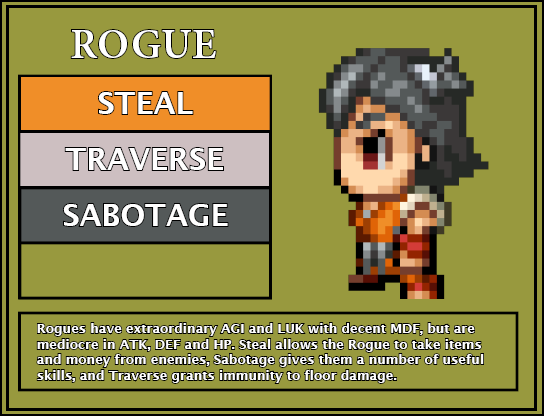
Let's start with something familiar. The Rogue has the ability to steal items and gold from enemies with varying degrees of success. As there are items and equipment that can only be obtained through theft, the Rogue is valuable for any completion-focused player. Their Sabotage skillset gives them access to buffs, debuffs, and status effects, giving them added usefulness in battle. Lastly, Traverse represents the archetypal Rogue's ability to avoid traps and sneak around. Here, it means they're immune to all kinds of floor damage, which can be a godsend in the long run. Bring a Rogue if you want to rob enemies blind and add extra utility to your party.
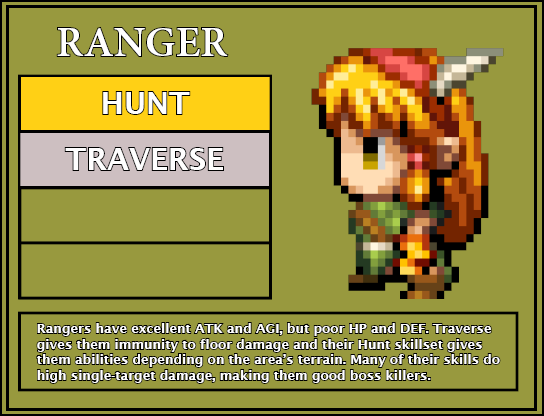
Still in semi-familiar territory, we have the Ranger. Rangers are fantastic at single-target damage, making them good boss killers, thanks in part to an attack that wouldn't look out of place on a melee character. Traverse functions the same as it does for the Rogue, giving immunity to floor damage. While Rangers have access to different elemental arrows depending on their location, they also gain special skills through the Survival command. Rangers may be unpredictable at times due to their skills taking power from the terrain, but they always have a useful trick up their sleeves. Bring a Ranger to substitute for a melee attacker or to add a degree of surprise and utility to your party.
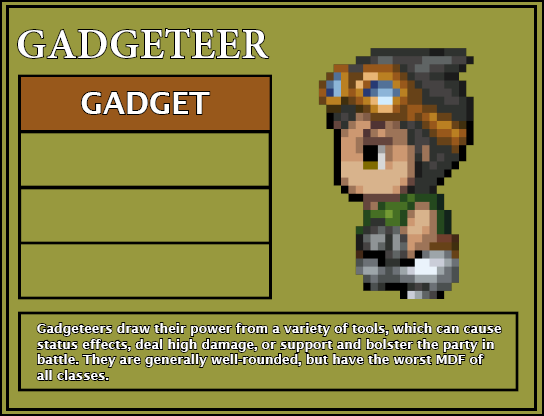
A class that requires a great deal of investment, the Gadgeteer provides reliable sources of physical damage and status effects through their Gadgets. Gadgets must be found or purchased in order for a Gadgeteer to use their mighty abilites, but the payoff is ultimately worth it. Furthermore, they have solid physical abilities, including a decently high Luck. A Gadgeteer can step into almost any party and feel right at home; just don't expect them to be amazing right out of the gate!
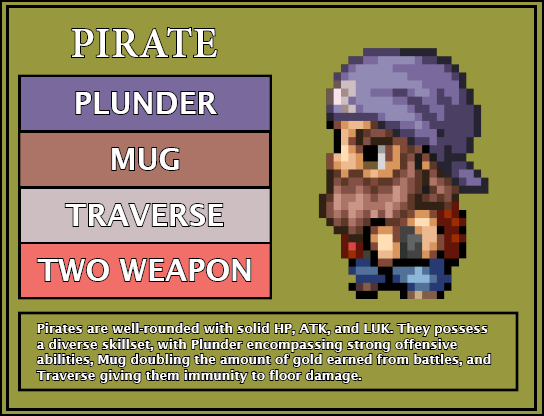
The master of the seven seas, the Pirate is a force to be reckoned with in and out of battle. Traverse works the same as it always does, granting immunity to floor damage, but the Pirate has another out-of-battle ability that makes them invaluable. Mug doubles the amount of gold the party receives after battle, turning the Pirate into a money making machine! If that wasn't enough, their Plunder skillset combines thievery, offensive spells, and healing abilities to give them a wide range of applications. While Pirates cannot steal items, Plunder does allow them to steal additional gold, letting them churn out even more cash. Bring a Pirate along to have an essential jack-of-all-trades character who will keep you rolling in dough.
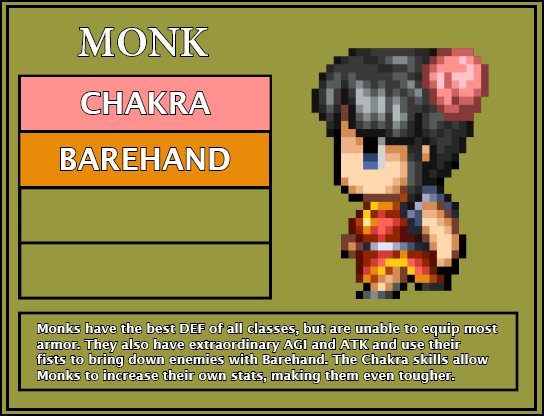
The advanced mischief class, the Monk is nothing to sneeze at. Their Barehand skill gives them great bonuses to Agility, Defense, and Attack as long as they don't equip weapons. Armor for Monks is limited, but who cares when you've got the best natural defense around? While other classes will eventually catch up to and surpass the Monk thanks to equipment options, the Monk will remain useful well into the end game. Lastly, Chakra makes Monks even more formidable, as it allows them to boost their own statistics, letting them churn out massive amounts of damage. Bring a Monk to wipe enemies out before they can blink.
Information on Master Classes will be posted here when it becomes relevant.
INFORMATION ON THIS PAGE IS BEING REWRITTEN AND REVISED FREQUENTLY
Classes in The Seven Seals are split into three broad categories: Melee, Mischief, and Magic. Each group contains 4 basic classes, 1 advanced class, and 1 master class. This adds up to 18 different class options in total. In addition, each of the 4 heroes have their own unique class that combines elements of other classes with special abilities not available to them.
Class attributes are ranked on a scale of S-F, with S being the absolute best and F being nonexistent. A class with an S in something is the best at that particular attribute, while a class with an F has no skill in that area. For example, Warriors, which have Fs in MP, will never, ever get a single point of MP without changing classes. There are slight variations in what the scale represents; both Rangers and Black Mages have Ds in Defense, for example, yet Rangers actually have slightly better Defense than Bards. The letter grade shouldn't be taken as an absolute scale, but more of a guideline regarding class strengths and weaknesses.
Read on for an overview of the classes available in The Seven Seals.
CLAS 201: Melee Classes
Melee classes hit things. They hit things better than other classes hit things and can be hit more times than other classes in return. Melee classes generally have excellent Attack, Defense, and HP, but lack Magical Defense or Magical Attack and may have sub-par Agility as well. Melee classes lack a wide variety of skills, but make up for that with sheer fighting spirit.

Warriors are straightforward, simple killing machines. As the image denotes, Warriors can equip almost all weapons and armor. Their Multi-Attack ability allows them to unleash a flurry of blows, at the cost of leaving them unable to act for a short while. However, they lack any other skills, making them a one trick pony of sorts - albeit a very useful trick. Take a Warrior if your party needs some serious physical firepower or if you're the old-school type who believe fancy skills are no substitute for old fashioned murder.

Skirmishers sacrifice some defensive power in exchange for excellent offense and speed. With the ability to wield two weapons, they can really crank out the damage. In addition, their Ambush skill increases the chance that the party will strike first and gain the upper hand in battle; this valuable advantage means the Skirmisher plays well in parties that are all about crushing their opponents before getting crushed in return. Bring a Skirmisher along to add some much needed speed to a lethargic party or make a lightning-fast group even faster.

Paladins straddle the boundary between Melee and Magic. They have a well-rounded set of statistics, good equipment selection, and a variety of healing and anti-undead skills to round them out. While Paladins will never match a Warrior's damage output and their Magic Attack isn't quite as good as the Cleric's, meaning their healing won't be as effective, they act well as a middle ground between the two. Bring a Paladin along if you've got three characters and aren't sure what to do about a fourth. They're helpful in a variety of situations.

Warlords never say die. With stellar Defense and a mountain of HP, these guys will be up and kicking long after everyone else has gone down. Their Inspire skillset allows them to buff allies and debuff enemies, making them a great class to build an offense around. Great Shield increases the damage reduction from defending and also allows a Warlord to step in and protect an ally when their life is on the line. Players who understand the importance of defense should bring along a Warlord and watch those Game Overs disappear.

Templars are the advanced melee class, accessible in the recruiting screen through secret methods. As the image notes, Templars are to magical attacks what Warlords are to physical attacks, but even better. Templars have complete immunity to ALL forms of magic, including healing spells and buffs, meaning that novice players should think carefully when bringing one along. Their Purge abilities allow them to disrupt enemy spellcasting and can change the tide of battle in an instant when used properly. Templars are a great option for players looking for a more challenging experience or those who want more advanced strategic options in battle.
CLAS 215: Magic Classes
Magic classes cast spells with a variety of effects. While there are non-magic classes that cast spells, they lack the specialization that magic classes have. Mages generally have excellent MP, Magic Attack, and Magic Defense with solid Agility as well. However, they have poor Attack and Defense for the most part as well as bad HP. Most magic classes learn spells that are useful in and out of battle.

A class that doesn't require much of an introduction, Clerics act in The Seven Seals the same way they do in most games. They specialize in healing magic and offer some offensive spells that are mostly focused on doing damage to undead. In addition, they have access to a solid selection of buffs to keep the party fighting in tip-top shape. Think of the Cleric as a counterpart to the Paladin. One is more melee focused and one is more magic focused. Bring along a Cleric if you want to stay alive and have a decent secondary or tertiary damage dealer.

You've seen this before. Black Mages do what they always do: devastate enemies and crumple when faced with a light breeze. In addition to their robust magical offenses, Black Mages also have access to some useful utility spells and debuffs. Bring along a Black Mage for sheer magical firepower; they are especially useful in the first two chapters, where your heroes lack great magical ability.

Bards blend the barrier between Mischief and Magic. They run off their own, semi-unique list of spells, but also have access to some standard magic. They require some extra investment due to songbooks, but they gain access to useful and powerful skills, so it's worth it in the end. They have more utility spells than other magic classes and also have access to unique buffs and debuffs. Bringing a Bard instead of a Black Mage or Cleric is a risky move, but one that provides a party with a lot of different strategies.

The Illusionist learns very few offensive or healing spells, but they can make their fellow party members even better than they already are. Think of the Illusionist as a magical version of the Warlord; they can buff and debuff like crazy and act as a solid center for a balanced party. They also have access to some utility spells, making them a good support character if nothing else.

Red Mages are the advanced magic class, combining the powers of black and white magic to give them unparalleled utility. Ironically, they do not learn any utility skills, so bringing one along might cause some headaches out of battle. In addition, Red Mages cannot learn the most powerful spells that classes like the Black Mage and Cleric can. They make up for this with decent physical stats, allowing them to serve as a handy secondary attacker in a pinch. Bring a Red Mage along if you're sitting at three members and unsure how to complete your party. You really can't go wrong with one, if you can figure out how to add them.
CLAS 221: Mischief Classes
In general, mischief classes are a mixed bag. They all offer different skills and out of battle utility, but do so in radically different ways. Some require special items to learn skills, others do better without items, and some could be placed in any of the three categories and feel right at home. Overall, mischief classes have great Luck and Agility and that's about all that binds them together.

Let's start with something familiar. The Rogue has the ability to steal items and gold from enemies with varying degrees of success. As there are items and equipment that can only be obtained through theft, the Rogue is valuable for any completion-focused player. Their Sabotage skillset gives them access to buffs, debuffs, and status effects, giving them added usefulness in battle. Lastly, Traverse represents the archetypal Rogue's ability to avoid traps and sneak around. Here, it means they're immune to all kinds of floor damage, which can be a godsend in the long run. Bring a Rogue if you want to rob enemies blind and add extra utility to your party.

Still in semi-familiar territory, we have the Ranger. Rangers are fantastic at single-target damage, making them good boss killers, thanks in part to an attack that wouldn't look out of place on a melee character. Traverse functions the same as it does for the Rogue, giving immunity to floor damage. While Rangers have access to different elemental arrows depending on their location, they also gain special skills through the Survival command. Rangers may be unpredictable at times due to their skills taking power from the terrain, but they always have a useful trick up their sleeves. Bring a Ranger to substitute for a melee attacker or to add a degree of surprise and utility to your party.

A class that requires a great deal of investment, the Gadgeteer provides reliable sources of physical damage and status effects through their Gadgets. Gadgets must be found or purchased in order for a Gadgeteer to use their mighty abilites, but the payoff is ultimately worth it. Furthermore, they have solid physical abilities, including a decently high Luck. A Gadgeteer can step into almost any party and feel right at home; just don't expect them to be amazing right out of the gate!

The master of the seven seas, the Pirate is a force to be reckoned with in and out of battle. Traverse works the same as it always does, granting immunity to floor damage, but the Pirate has another out-of-battle ability that makes them invaluable. Mug doubles the amount of gold the party receives after battle, turning the Pirate into a money making machine! If that wasn't enough, their Plunder skillset combines thievery, offensive spells, and healing abilities to give them a wide range of applications. While Pirates cannot steal items, Plunder does allow them to steal additional gold, letting them churn out even more cash. Bring a Pirate along to have an essential jack-of-all-trades character who will keep you rolling in dough.

The advanced mischief class, the Monk is nothing to sneeze at. Their Barehand skill gives them great bonuses to Agility, Defense, and Attack as long as they don't equip weapons. Armor for Monks is limited, but who cares when you've got the best natural defense around? While other classes will eventually catch up to and surpass the Monk thanks to equipment options, the Monk will remain useful well into the end game. Lastly, Chakra makes Monks even more formidable, as it allows them to boost their own statistics, letting them churn out massive amounts of damage. Bring a Monk to wipe enemies out before they can blink.
Information on Master Classes will be posted here when it becomes relevant.












